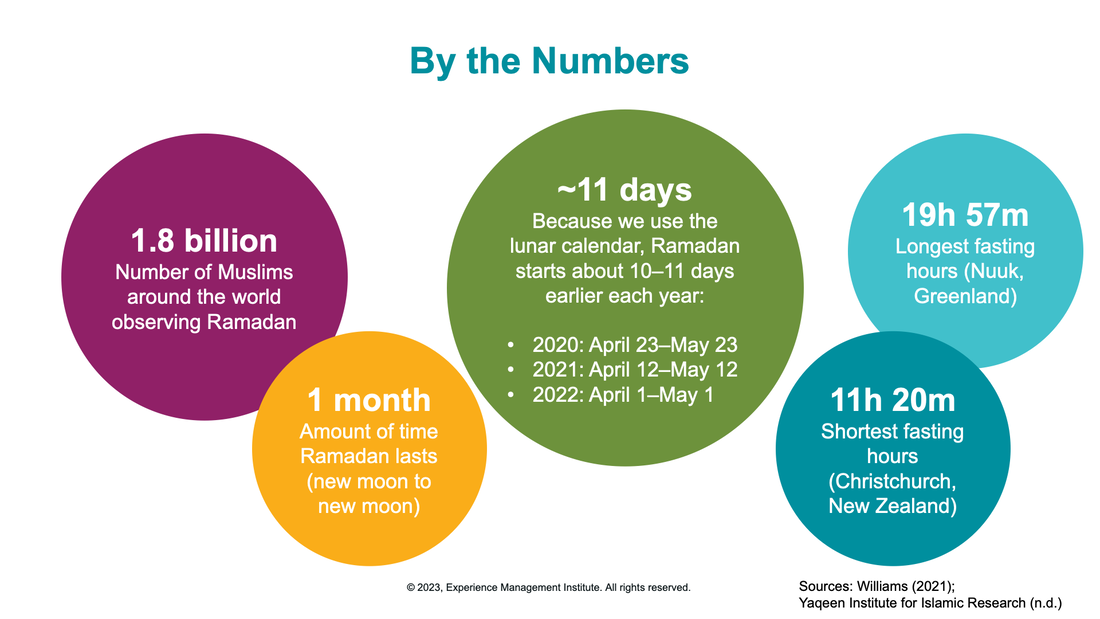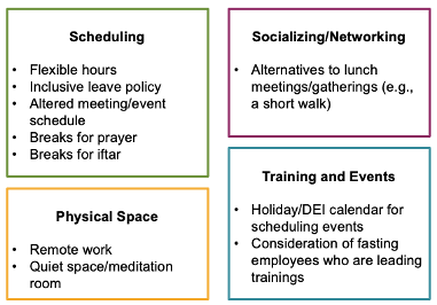|
By Dr. Naima Khandaker, Vice President of Strategy, Experience Management Institute If, like me, you observe the holy month of Ramadan, let me first wish you, “Ramadan Mubarak!” If you’re someone who leads DEI efforts at your organization or who has Muslim employees or colleagues, you may be wondering how you can support them during this month. We’ve got you covered! Below, I share some basics about Ramadan, discuss common myths, and offer tips for creating a supportive workplace for Muslim employees. Ramadan: The Basics This year, Ramadan is observed from the evening of Wednesday, March 22 to the evening of Thursday, April 20 (dates may vary slightly between local communities). Based on the lunar calendar, it lasts about a month from new moon to new moon. Ramadan is the holiest month of the year for Muslims because it commemorates the period in which the Prophet Muhammad (peace be upon him) received the first verses of the Qur’an. For many Muslims, it is a time of year dedicated to the remembrance of God through fasting, prayer, charity, service, and self-reflection. Eid al-Fitr, or the “festival of breaking the fast,” marks the end of Ramadan. It’s common for Muslims to gather for congregational prayers at the mosque on Eid; give special charity (zakat al-fitr); and celebrate with food, gifts, and time with loved ones. Before getting into specific tips to support employees, let’s bust some myths about Ramadan. Myth #1: Ramadan is all about fasting. Many people think Ramadan is all about fasting. It’s true that fasting—abstaining from food and drink from before sunrise to sunset—is an important component of Ramadan. But this month is about more than just fasting. It’s about learning self-discipline, creating healthy habits, and trying to become better people. In addition to fasting, common activities during Ramadan include charity, community service, night prayers (taraweeh), pre-dawn prayers (tahhajjud), iftar (breaking the fast) with loved ones, engaging with the Qur’an, and spending the night in worship (qiyyam). Myth #2: All my Muslim colleagues are fasting. Although many Muslims fast every day during Ramadan, there are several reasons why some may not be fasting. They include health issues such as illness, chronic medical conditions, certain disabilities, or eating disorders. Other reasons for not fasting include travel, menstruation, pregnancy, nursing, and age (i.e., children, elderly). Myth #3: I can’t eat in front of my Muslim colleagues. Muslims are generally used to people eating in front of us. There’s no need to hide your lunch! However, there are some things employers and colleagues can do to show awareness and sensitivity, which I discuss below. Tips to Support Muslim Employees during Ramadan Tip 1: Acknowledge the month. Whether it’s posting on your website or social, sending an all-staff email, or reaching out directly to employees who observe Ramadan, taking the time to recognize the month means a lot. Tip 2: Be flexible. Not all types of flexibility are feasible in all workplace contexts, but in every organization, there are opportunities to be flexible in some way. Consider how you can be aware and accommodating within the parameters of your organization. Here are a few suggestions: As with many DEI-focused best practices, note that several of these flexibilities can support lots of employees, not only those who observe Ramadan! Also know that not all Muslim employees’ needs are the same. This is why it’s important to create an environment where employees feel comfortable requesting the accommodations they need. It may also be useful to ask Muslim employees what would be helpful to them, but only if this can be done so through a tactful approach that does not assume that all Muslims observe all aspects of Ramadan. Tip 3: Be sensitive. Fasting can be very challenging, and efforts to be sensitive to that are appreciated. As I mentioned above, don’t feel like you need to hide your food. However, you might still ask, “Is it ok if I eat in front of you?” Also, when possible, avoid scheduling events such as potlucks, lunches, or evening obligations. When those types of events are unavoidable, allow employees to skip them or give employees to-go containers. Additionally, consider ways to be supportive of employees who need to break their fast at work, such as making sure they have time to do so and someone to cover their duties while they have their iftar meal. Tip 4: Go the extra mile. If you can, consider going the extra mile! Have snacks or water available for Muslims who work in the evenings. You might also offer to see if your organization matches donations, as increased charitable giving during Ramadan is common for many Muslims. Tip 5: Provide education and resources. Prior to the start of Ramadan, provide resources for managers and employees. To best support staff members, managers need to have awareness of Ramadan and when it is, what fasting entails, how to be supportive and sensitive toward Muslim employees, and a reminder that Muslim employees may request time off on and around Eid al-Fitr. For employees who do not manage others, you can still raise awareness of Ramadan and how to support Muslim colleagues. Ramadan offers employers the opportunity to create a safe and welcoming space for Muslim employees. Start by acknowledging the month, being flexible and sensitive (or even going the extra mile!), and providing education and resources for managers and employees. Remember that building an inclusive workplace benefits everyone.
Comments are closed.
|
Archives
March 2023
Categories |



 RSS Feed
RSS Feed
